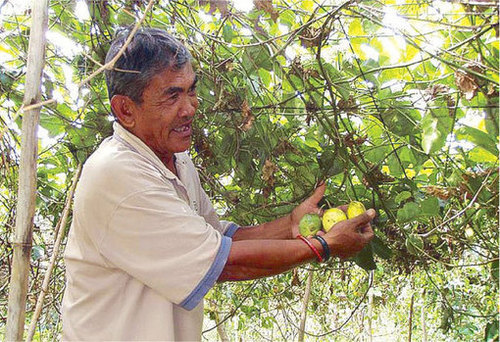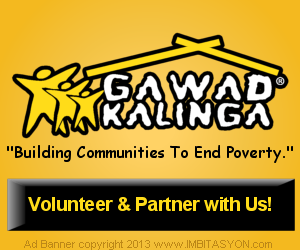SOCIAL BUSINESS SUMMIT 2013: No ordinary love story | Headlines, News, The Philippine Star | philstar.com
By Thomas Graham (The Philippine Star)
It has all the hallmarks of a typical “east meets west” love story: a successful British businessman visits the Philippines on a short trip, falls in love and showers the object of his affection with gifts and kind words.
This time, however, there is a twist, since Dylan Wilk found love not in an Internet chat room or on the beautiful beaches of Boracay, but in a Gawad Kalinga village. “The more I interacted with the people who were part of GK, the more I fell in love with Filipinos. The most heroic people I had met in my life were there – ordinary people who were sacrificing so much just to care for others.”
Having already left the business world at the age of 25 in search of a more meaningful career, Dylan encountered a cause – GK – which inspired him to give away all his wealth. However, his philanthropy could not last forever – Dylan’s money was running out while the challenge to end poverty would remain as overwhelming, and as urgent, as ever.
Going beyond charity
Having already fallen in love with the Philippines, Dylan then fell for a Filipina, Anna Meloto, and the couple married in 2004. In many ways, Dylan and Anna were coming from opposite extremes. Anna, the daughter of Gawad Kalinga founder Tony Meloto, had watched her father tirelessly help build the Gawad Kalinga movement. She remained committed to the cause, but also felt the time was right to set up a business and provide a sustainable future for their prospective family. Dylan, however, remained unconvinced: “When I left the business world, I never wanted to go back. The obsession with profit didn’t bring out the best in me.”
Having decided to spend a year in the US, Anna and her sister Camille came across their business idea: “We noticed that natural health and beauty products were available to ordinary Americans at normal prices, while in the Philippines only the elite could afford them. However, looking at the ingredients, we realized that a lot of them could be grown in our country,” Anna recalls. “Camille and I really wanted to start an enterprise, but we didn’t want to do it without Dylan’s business experience.”
Camille and Anna’s ideas got a reluctant Dylan thinking: instead of philanthropy, what if the power of business could be galvanized to help eradicate poverty? What if the raw materials could be grown in GK communities, therefore providing them with a source of income?
Camille, Dylan and Anna moved back to the Philippines and established Human Nature. Starting out in a cramped room with “zero marketing budget,” Human Nature has since emerged as one of the fastest growing beauty and cosmetic brands in the Philippines under its slogan: pro-Philippines, pro-poor, pro-environment. All of the products are made with natural ingredients which are sourced – wherever and whenever possible – in the Philippines.
I visited one of the communities in Davao where sunflower and passion fruit are grown for Human Nature products and there I met the GK village leader Jaime, a man who has been farming for over 20 years: “Before, it was very difficult because we were dependent on selling to a middle-man, who was in a position to entirely dictate the price to us.” If the price was too low, Jaime explained to me, the farmers in his community earned barely enough to survive. With little incentive to make the land productive and profitable, many farmers leave the countryside in search of jobs and opportunities in the city, exacerbating the country’s urban overcrowding.
Empowering farming communities
However, Human Nature goes beyond dealing directly with growers and giving an above-average price for the raw materials it sources. I visited another community outside Bacolod where the village has invested in a processing plant for lemongrass. By doing it on site, value is added to the product and the proceeds remain within the community.
Furthermore, a community in Bicol has recently pooled their savings to purchase an extra four hectares of land in order to expand their citronella production, thereby producing more oil which they can sell on to Human Nature (or, potentially, anyone else). This was a major step forward, Dylan tells me, as they took this initiative without Human Nature asking them to do so: “The community has gone from a beneficiary mentality to taking control themselves, expanding their capacity to produce without our help.”
Of course, there is no use in a community purchasing land if they lack the experience or expertise to manage this land effectively: “In addition to specific agricultural training, we are teaching farmers to conduct simple record keeping and financial projections, to make sure they can maximize the profits they generate,” Anna tells me.
Another aspect of Human Nature’s advocacy for social business is their commitment to recruiting nearly half of their staff from impoverished communities, thereby offering opportunities, training and an “ethical” wage (as opposed to a minimum wage) of at least P750 per day to staff who would otherwise languish on the margins of the mainstream economy. Implementing this policy brings challenges: “Some of our staff haven’t had the education we’ve had, and often they haven’t had good role models in their environment either, so you have to expect that they will mess up occasionally.” However, to motivate the less schooled to give their best, free from the constant fear of losing their job, Human Nature has introduced a no firing policy: “As a result, our staff have realized that we believe in them, and that we are not going to give up on them,” Dylan maintains…….
Read/See on www.philstar.com













